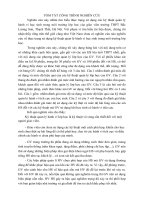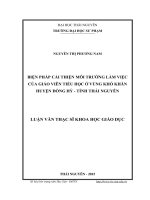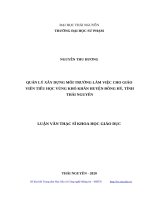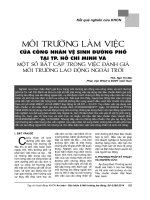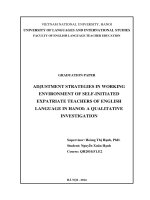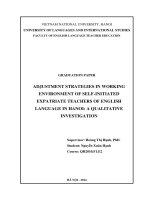CHIẾN LƯỢC THÍCH NGHI VĂN HÓA TRONG MÔI TRƯỜNG LÀM VIỆC CỦA GIÁO VIÊN TIẾNG ANH NGOẠI QUỐC TẠI HÀ NỘI, VIỆT NAM: MỘT NGHIÊN CỨU ĐỊNH TÍNH
Bạn đang xem bản rút gọn của tài liệu. Xem và tải ngay bản đầy đủ của tài liệu tại đây (455.45 KB, 83 trang )
VIETNAM NATIONAL UNIVERSITY, HANOI
UNIVERSITY OF LANGUAGES AND INTERNATIONAL STUDIES
FACULTY OF ENGLISH LANGUAGE TEACHER EDUCATION
GRADUATION PAPER
ADJUSTMENT STRATEGIES IN WORKING
ENVIRONMENT OF SELF-INITIATED
EXPATRIATE TEACHERS OF ENGLISH
LANGUAGE IN HANOI: A QUALITATIVE
INVESTIGATION
Supervisor: Hoàng Thị Hạnh, PhD.
Student: Nguyễn Xuân Hạnh
Course: QH2010.F1.E2
HÀ NỘI - 2014
ĐẠI HỌC QUỐC GIA HÀ NỘI
TRƯỜNG ĐẠI HỌC NGOẠI NGỮ
KHOA SƯ PHẠM TIẾNG ANH
KHÓA LUẬN TỐT NGHIỆP
CHIẾN LƯỢC THÍCH NGHI VĂN HÓA TRONG
MÔI TRƯỜNG LÀM VIỆC CỦA GIÁO VIÊN
TIẾNG ANH NGOẠI QUỐC TẠI HÀ NỘI, VIỆT
NAM: MỘT NGHIÊN CỨU ĐỊNH TÍNH
Giáo viên hướng dẫn: Hoàng Thị Hạnh, PhD.
Sinh viên: Nguyễn Xuân Hạnh
Khóa: QH2010.F1.E2
HÀ NỘI – 2014
ACCEPTANCE PAGE
I hereby state that I: Nguyễn Xuân Hạnh, being a candidate for the degree of
Bachelor of Arts (TEFL) accept the requirements of the College relating to the
retention and use of Bachelor’s Graduation Paper deposited in the library.
In terms of these conditions, I agree that the origin of my paper deposited in the
library should be accessible for the purposes of study and research, in accordance
with the normal conditions established by the librarian for the care, loan or
reproduction of the paper.
Signature
Date
3
ACKNOWLEDGEMENTS
This thesis would not have been possible without the contributions of
many people. I would like to express my gratitude for:
• My supervisor, Dr. Hoang Thi Hanh. I have been and will always
be thankful for her unfailing support, professionally and
personally. Dr. Hanh has been there constantly from the
beginning to provide me with knowledge, advice, and
comments with strict academic integrity and respect to my
autonomy. She is the person I feel indebted to the most, for her
loving, positive, and responsible outlook on life has been my
constant inspiration to carry on with this thesis, even in the face
of illness and desperation. But for her supervision, I would not
have been able to successfully complete this study. I learned so
much from her, and owed so much to her.
• The expatriate teachers who have devoted their precious time
to take part in this study.
• The two anonymous expatriate teachers of English that inspired
this study.
• My lecturers at University of Languages and International
Studies, who have taught and inspired me in the last four years.
Especially, I would like to thank Ms. Dinh Hai Yen, my lecturer,
for being the wonderful teacher who always showed great
patience and perseverance that I strive to resemble.
• My friends at class QH.2010.E2, my friend Nguyen Lan Phuong
and Tran Ngoc Viet Hoai, for the emotional support and
constructive comments. Phuong and Hoai inspired me the most
with their care and encouragements.
• Michael “Aki” Atkinson, whose independence and integrity has
inspired me every step of the way.
4
• My family, including my Mother and Father, whose love I cannot
even describe, who have always encouraged and inspired me to
move forward and be the person I can be.
ABSTRACT
NFL Project 2020 addressed Vietnam’s compelling need for improving
communication in English that, as a consequence, has transformed the country as
a destination for “self-initiated expatriate (SIE)” English teachers. They are the
people who choose to set out to work in a foreign country without the
assignment or the help of a home company. Analyzing the content of transcripts
and field notes from six semi-structured individual interviews with six self-
initiated expatriate teachers of English who have spent from about 9 months to 7
years in Hanoi about their process of adjusting to culture in the Vietnamese
workplace, this study provides researchers, HRM practitioners, and policy
makers an insight into the self-initiated expatriate work life in this South-East
Asian country. Participants exhibited a passive approach to cultural adjustment, a
lack of preparation, tendency to display ethnocentrism, and reported a critical
need for better training, job descriptions and organizational support. The findings
suggest that further research and certain HRM practices should be conducted to
encourage integration between Vietnamese teachers and managers and this
diverse group of foreign teachers, not only to foster a work environment that
embraces support and diversity, but also to ensure the quality of the English
training programs they are directly involved with as teachers.
Key words: Self-initiated expatriate; expatriate adjustment; intercultural
communication; Vietnam; NFL Project 2020; Human resource management.
5
TABLE OF CONTENTS
6
LISTS OF FIGURES
Figure 2.1 Berry (1997)’s model of acculturation strategies 8
7
LIST OF TABLES
8
CHAPTER 1: INTRODUCTION
1.1 STATEMENT OF THE PROBLEM AND RATIONALE FOR THE
STUDY
Nowadays, the role of English in Vietnam is becoming more and more important. In
order to integrate with a global market economy after Doi Moi economic reform in
1986, the Vietnamese government adopted the socialist-oriented market economy,
which allows the establishment of private businesses and foreign investment, including
foreign owned enterprises. Since then, fluency in English has intriguingly become a
compulsory requirement in almost every job description. Along with the promotion of
the free market economy came the development in tourism, leading to Vietnam’s
transformation into an appealing tourist attraction. According to the Vietnam Ministry
of Culture, Sports, and Tourism, in 2013, Ha Noi is on the eighth place of
TripAdvisor’s list of the top travel destinations on the rise, after only two other Asian
cities, Kathmandu (Nepal) and Sapporo (Japan). The need to communicate in English
has become tremendous, resulting in the multitudinousness of English learners.
Replacing Russian, English is now the main foreign language studied in Vietnamese
schools and tertiary institutions.
The need for native speakers of English who can teach the language, therefore, has
become compelling. In January 2013, the Vietnamese Ministry of Education and
Training (MoET) signed an agreement with Australia’s English Language Company
(ELC), under which thousands of native English speakers will come to teach their
language in Vietnam in the coming years. Those teachers, coming from the U.S., the
U.K., Canada, New Zealand, Ireland, and South Africa, will teach English in K-12
schools, junior colleges, and universities, as a part of Project 2020, a national English
improvement project. Within this year, up to 350 teachers will be sent to Vietnam on
this project. Predictably, these teachers will be coming to the big cities, especially
Hanoi and Ho Chi Minh. A study on their adjustment will be of value to the field of
human resource management and intercultural studies, especially when so far, very
little has been done in the field of expatriate management in Vietnam in general and on
English language expatriate teachers in particular.
However, unlike the Vietnamese teachers of English, who are accustomed to the
culture of their own nation, the success of those expatriate teachers of English has been
often not just dependent on their qualifications but also their expatriate adjustment.
Failing to adjust to the Vietnamese way of working, interacting, and living can lead to
underperformance and lots of obstacles in remaining devoted to the profession, and
even abandoning it. As cited in by Johnston (1997), in his article “Do EFL teachers
have careers?”, Maley (1992) described EFL/ESL teaching as permeable, meaning that
it is “an easy occupation to enter and to leave” (Johnston, 1997, p. 686). In case of
expatriate teachers, the pressure to cope with and accustom oneself to a foreign culture
makes it even more challenging for this occupation to be followed. The demand for
expatriate teachers to stay in Vietnam as long as possible, therefore, puts a big
emphasis on assisting these teachers in the process of acculturation – “the process by
which group members from one cultural background adapt to the culture of a different
group (Rieger & Wong-Rieger, 1991, as cited in Poole, p. 176).
1.2 RESEARCH QUESTIONS
This study focuses on an under-research group of expatriates, the self-initiated
expatriates. To date, research on international management has provided a body of
literature focused on the perception, selection, training, in both home and host
countries, of international assignees, the people who are sent abroad on job
assignment. However, there exists a group called self-initiated expatriates, for the
simple reason that they choose to become expatriates in a foreign country on their own
initiative. Self-initiated expatriation does not only happen in neighboring countries, but
between different continents. For example, the willingness of Europeans to migrate
within and beyond the continent for employment has become an identifiable trend
(Strack et al., 2007). They have recently been recognized as an important element of
the global workforce (Tung, 1988), but studies about them are severely lacking
(Bozionelos, 2009; Al-waqfi, 2012) In the particular context of Vietnam and the
particular profession of teaching, there is a need for empirical research on self-initiated
expatriate teachers’ cultural adjustment, as little has been done on the subject. This
inspired the researcher to do this study to investigate the way expatriate teachers view
and adapt to Vietnamese culture.
It will be superficial to explore the way the expatriates deal with coping with and
learning about Vietnamese culture without knowing the way they perceive the process
of acculturation. The more important they view adjustment, the more effort and
willingness they put into adjusting themselves. In other words, the perception of an
expatriate about the adjustment can intensely affect the success of his adjustments.
Tung (1998) highlighted the importance of the expatriates’ perception when she
addressed the fact that “little is known about whether expatriates perceive international
assignments as having a positive or negative effect on their subsequent career
advancement” as a deficiency and advocated focusing on expatriates’ attitudes towards
career development opportunities and cultural experience abroad.
The study will focus on the adjustment strategies that self-initiated expatriate teachers
of English in Hanoi use to handle cultural challenges in the workplace. The main
research questions are:
1. How do self-initiated expatriate teachers of English language in Hanoi
perceive about the importance of expatriate adjustment to their occupation?
2. What are the main problems that self-initiated expatriate teachers of English
language encounter in the work place in Hanoi?
3. What are the adjustment strategies used by them in the face of these
problems?
1.3 SIGNIFICANCE OF THE STUDY
The objectives of this empirical study are to:
(1) Explore incoming expatriate English teachers’ adjustment to teaching and
living etiquettes in Hanoi, Vietnam.
(2) Help institutions and educational organizations, such as universities, schools,
English training centers, develop more detailed job descriptions and training
guidelines.
(3) Help bridge the gap in self-initiated expatriate research in the context ò
Vietnam.
This study was done with hope to tighten the relationship between the Western
expatriates and Vietnamese nationals and provide a background for further studies on
expatriate adjustments and acculturation in Vietnam, especially there is a lacking of
value studies in this field of research. Later studies can draw from the findings of this
study to later build up a database serving the purpose of studying intercultural
communication and human resource management.
1.4 SCOPE OF THE STUDY
This investigation was conducted to determine the importance of cultural
adjustment as perceived by the group of self-initiated expatriate teachers living and
teaching in Hanoi, Vietnam, as well as the strategies they used to solve conflicts and
challenges at the workplace. The study looked into various aspects of their work life,
such as intercultural interaction with host nationals, support and assistance,
organizational culture, and problems of expectation and beliefs.
1.5 ORGANIZATION
This study includes five chapters. Chapter 1, Introduction, introduces the research
problems and questions, significance and scope of the study. Chapter 2 reviews the
available literature about expatriation and self-initiated expatriation and provides a
conceptual framework, and explains terminology used in the study. Chapter 3 outlines
the methodology, research instruments and procedures. Chapter 4 is divided into 4
sections, the first 3 of which answer the research questions, while the last draws out the
implications of the study. Chapter 5, Conclusion, sums up the findings and reviews the
study’s limitations, and makes suggestions for further studies.
CHAPTER 2: LITERATURE REVIEW
2.1 EXPATRIATE ADJUSTMENT AT INDIVIDUAL LEVEL
Expatriate adjustment is an important focus of expatriate research and acculturation
research. It is commonly perceived as the process in which an individual induces
necessary changes to achieve a fit and reduced conflict between his/her own
inclinations and the demands of an unfamiliar cultural environment (Black et al.,
1991). This fit is important because it is a predictor of an expatriate‘s job performance
(Parker & McEvoy, 1993) and turnover (Black & Stephens, 1989).
2.2 BLACK ET AL (1991)’S MODEL OF EXPATRIATE ADJUSTMENT
Different models have been developed to understand the process of expatriate
adjustment (Gudykunst & Hammer, 1987; Aycan, 1997; Black et al., 1991), among
which, the most prominent is probably Black and colleagues (1991)’s framework in
which expatriate adjustment is treated at three levels: Degrees, facets, and modes.
2.2.1 DEGREES OF ADJUSTMENT
Black et al (1991) addressed the fact that degree of adjustment can be viewed as “both
a subjective and objective concept”. Subjectively, it is the degree of comfort the
expatriate feels in the new role and how adjusted he or she is to the role requirements.
Objectively, it can be used to measure the degree to which the person has mastered the
role requirements through measurement his or her performance. This study views
adjustment as a subjective issue.
Dawis & Lofquist (1984) pointed out that the degree of adjustment is determined by
satisfaction (the gap between the extent to which the work environment meets the
needs of the individual) and satisfactoriness (the gap between the extent to which the
individual's abilities meet the demands of the work role).
From the work of Lysgaand (1955); Oberg (1960); and Torbiorn (1982), the U-curve of
the cross-cultural adjustment model was developed. The model has four phases. The
first is the “honeymoon phase”, when the expatriates just arrived at the new culture and
is fascinated by it (Gullahorn & Gullahorn, 1963). In stage two, culture shock, the U-
curve goes through a dip when the expatriate is confronted with a new environment
(Adler, 1986; Church, 1982). Over time as adjustments are made and they become
more adjusted to the new culture, learn the appropriate behaviors, they undergo the
third phase (Harris & Moran, 1989), when the dip subsides and the curve starts to rise.
In the fourth stage, the individual's adjustment is generally complete. They now can
properly perform the necessary behaviors to function effectively and without anxiety
due to cultural differences. (Oberg, 1960) A correlation between degree of adjustment
with the time the expatriate spends in the host country is found. (Lu, 1990; Nash, 1991)
2.2.2 MODES OF ADJUSTMENT
The concept of mode stem from the work of Berry (1980, 2001) on theory of
acculturation, especially acculturation attitudes. According to him, there are two
dimensions of acculturation: (1) Cultural maintenance, and (2) contact and
participation with the national/host group, which has become known as acculturation
attitudes (Berry, 1980). The former deals with the question “To what extent do people
wish to maintain (or give up) their cultural attributes?”, the latter “To what extent do
people wish to have contact with (or avoid) others outside their group?”. Based on
these two dimentions, four acculturation strategies are distinguished by Black and
colleagues.
• Assimilation (individuals do not wish to preserve their cultural norms and
seek daily interaction with members of the other group);
• Separation (individuals wish to preserve their cultural norms and wish to
avoid interaction with members of the other group);
• Integration (individuals wish to maintain original culture and interact daily
with other group);
• Marginalization (individuals show little interest in neither cultural
maintenance nor interaction with members of the other group).
Figure 2.1. Berry (1997)’s model of acculturation strategies
The modes of expatriate work adjustment were developed from the studies of
Nicholson (1984) and Black (1991). Nicholson (1984) identifies the four modes of
expatriate work adjustment based on two dimensions: (1) The alteration of one’s own
behaviors and attitudes and (2) the alteration of the working environment (such as role
requirements and expectations). Many other scholars (Dawis and Lofquist, 1984;
Feldman and Brett, 1983; Van Maanen and Schein, 1979) also advocate the same
argument. The modes of expatriate adjustment, are:
• Replication: individuals make few alterations in their identity or behaviors to
fit the role and make a few alterations in the work role.
• Absorption: individuals change their behaviors and attitudes to fit the role
and make no or very few changes in the role.
• Exploration: individuals change both their behaviors and attitudes and the
role.
• Determination: individuals remain relatively unaffected but the role is
altered.
Table 2.1 summarizes the four modes of work adjustment.
Table 2.1.
Modes of work adjustment
Mode of work
adjustment
Changing the self Changing the role
Replication No No
Absorption Yes No
Determination No Yes
Exploration Yes Yes
2.2.3 FACETS OF ADJUSTMENT
Three facets of adjustment are identified in Black et al (1991)’s work: adjustment
to work, adjusting to intercultural interaction with host country nationals, and
adjustment to the general environment. Work adjustment concerns job responsibilities,
supervision, and performance expectation. It reflects the degree of psychological
comfort at work. Intercultural interaction adjustment refers to the degree of
psychological comfort regarding different communication with host nationals and the
interpersonal styles used in the host culture. General adjustment refers to the degree of
psychological comfort with regard to various aspects of the host culture conditions.
The distinction of different facets is important because each of the facets is related to
different sets of variables, some of which overlap whilst others are unique. In the
context of this study, only adjustment at work is examined; however, the examination
of work adjustment will also sometimes involve looking into the other facets, for they
and interconnected.
2.2.4 ADTECEDENTS OF EXPATRIATE ADJUSTMENT AT WORK
Reviewing the theoretical literature on domestic adjustment and delineating the
important variables influencing international adjustment found in previous studies,
Black et al. (1991)’s model viewed adjustment as an outcome contingent upon two
antecedents: pre-departure factors, and post-arrival factors. Pre-departure factors, or
anticipatory factors, including previous overseas experience, cross-cultural training,
and selection processes, are considered to be the determinants of ‘anticipatory
adjustment’, the degree to which a prospective expatriate is adjusted prior to arriving
on their assignment. Post-arrival factors, or in-country factors include the expatriate’s
individual skills, job factors (e.g., role conflict), organization culture factors,
organization socialization factors, and non-work factors.
2.2.4.1 Pre-departure factors
Black et al (1991) stressed the importance of pre-departure factors, because if
there are appropriate anticipatory adjustments, the process of post-arrival adjustment
will be quicker and more effective. Many other scholars (Tung, 1988; Church, 1982;
Mendenhall, Dunbar, & Oddou, 1987; Nicholson & Imaizumi, 1993) agreed on the
positive influence of the pre-departure factors - previous oversea experience, cross-
cultural training, and selection processes – on expatriate adjustment. Church (1982,
p.549) claimed that “empirical findings support the importance of accurate prior
cultural experience or prior exposure…for sojourner adjustment.” Among these
factors, Black and colleagues put an emphasis on language ability (fluency in the host
country language). Nicholson and Imaizumi (1993) also point out that a lack of
language skills has long been recognized as a major barrier to effective
communications and perception.
2.2.4.2 In-country factors
These include the expatriate’s individual skills, job factors (e.g., role conflict),
organizational factors, and non-work factors, which will be outlined below.
2.2.4.2.1 Individual skills
Self-efficacy, relational skills and perceptional skills are important to expatriate
adjustment The concept of self-efficacy is built on research along similar lines by
Bandura (1977). Self-efficacy is the belief one has in oneself and one's ability to
persevere in the face of the foreign surroundings effectively, even on the occasion of
great uncertainty (Wright et al., 1995). It can also be perceived as the process in which
the expatriate shows the new behavior in a foreign environment, receive both negative
and positive feedback, use feedback to reduce uncertainty and facilitate adjustment
(Black et al, 1991). Basing from the work of Nicholson (1984), Black and colleagues
(1991) also suggest that levels of self-efficacy will be associated with modes of
adjustment that are directed at changing the environment (e.g., the work role) or the
individual. Studies on the negative psychological correlatives associated with low self-
efficacy and dysfunctional acculturation predict that bad adjustments can result in loss
of self-efficacy (Fan & Mak, 1998; Pinquart, Juang, & Silbereisen, 2003; Samers,
1998).
Relational skills are a repertoire of tools and techniques that work in a similar way to
reduce uncertainty in interpersonal communication and produce adjustment. Black
(1988) found a positive relationship between the percentage of time spent with host
nationals and general cross-cultural adjustment.
2.2.4.2.2 Job factors
Within the context of work, job factors clearly play an important part. Role clarity
(exact understanding of position requirements, policy and procedures), role discretion
(autonomy in adapting work role and setting), role novelty (differences between the old
and new work roles) and role conflict (incompatibility regarding expectation) are the
four factors proposed by Black et al (1991) from reviewing research done by several
scholars (Black, (1988); Nicholson (1984); Pinder & Schroeder (1987); Louis (1980);
and Dawis & Lofquist (1984)). While role clarity and role discretion have facilitating
effect on the adjustment process, enabling the expatriate to utilize previous behavior
patterns, role novelty and role conflict have an inhibiting effect on adjustment.
2.2.4.2.3 Organizational factors
Organizational factors are classified into two categories: cultural factors and
socializational factors. In terms of organizational cultural factors, organization culture
novelty, social support and logistical help are stressed. Especially in work adjustment,
the organizational culture novelty can influence adjustment in the same mechanism that
role novelty does. The higher the novelty, the more uncertainty, the less adjustment.
The social support of employers and co-workers can help improve adjustment, and so
can logistical support (such as housing, schools) provided for the expatriate. Because
most of it deals with non-work issues, logistical support is expected to have a stronger
relationship with interaction, and especially general adjustment, rather than with work
adjustment (Black et al 1991).
Organizational socialization factors, according to Van Maanen and Schein (1979,
p. 211–212), refer “to the fashion in which an individual is taught and learns what
behaviors and perspectives are customary and desirable within the work setting as well
as what ones are not.” In other words, they refer to the expatriate’s fitting in to a new
role in the context of an organization’s existing condition. From an idea first argued by
Fisher (1986), Black et al (1991) addressed that socialization can be discussed both in
terms of tactics and content, and proposed that they will affect role innovation. The
expatriate may or may not be expected to make changes in the work setting. This is
found to correlate with the modes of work adjustment.
2.3 SELF-INITIATED EXPATRIATES
2.3.1 DEFINITION AND OVERVIEW
They are called self-initiated expatriates, for the simple reason that they choose to
become expatriate workers in a foreign country on their own initiative. They have
recently been recognized as an important element of the global workforce (Tung,
1988).
The importance of expatriate adjustment in human resource management of
expatriate workers has long been stressed and studied by scholars. However, research
in the field of self-initiated expatriate adjustment in severely lacking (Bozionelos,
2009; Al-waqfi, 2012). While the definition of expatriate adjustment might be the same
for both self-initiated expatriates and international assignees, their perception and
strategies may differ greatly (Tams & Arthur, 2007). This part of the study is dedicated
to shedding some lights into making clear the difference between self-initiated
expatriates and expatriates on international assignment, and reviewing the literature on
self-initiated expatriate adjustment.
2.3.2 SELF-INITIATED EXPATRIATES VERSUS INTERNATIONAL
ASSIGNEES
As mentioned earlier, a large amount of the prior literature on expatriates has
focused on employees undertaking international assignments. These two groups are
different and can be put together in comparison and contrast. Several distinctive
characteristics of self- initiated foreign employees (SIEs) were identified (Arthur,
Pringle, & Barry, 1998).
First, they differentiate from the basic reason for expatriation. SIEs are not
employees of multinational organizations. They themselves make the decision to go
abroad to face the challenges of living and working in an unfamiliar environment
instead of being sent there for a position.
Second, SIEs tend to “see their international experience as a means of developing
themselves personally; achieving specific company goals is not a primary motivational
force for becoming an international worker”. (Al-waqfi, 2012, p. 5)
Third, SIEs do not receive training prior to departure from their company like
international assignees do. All of their preparation is based on experience and also self-
initiated. International assignees usually receive package of support including culture
and language training and other logistics support such as housing and health care
(Peterson, Napier & Shim, 1996, PricewaterhouseCoopers, 2005), whilst SIEs fund
their own trip through personal savings and rely mainly on themselves in the foreign
environment.
Fourth, SIEs are willing to traverse the world and work in foreign countries for
their self-development or for other personal agenda while international assigned
expatriate may not be willing to make the move to another country. SIEs do not follow
a traditional career path within an organization; they have a certain higher degree in
freedom and openness in achieving and viewing their career development
opportunities.
Fifth, while international assignment is often time-bound, the time limit for SIEs
to stay in a foreign country is often not clear and depends largely on their perspective.
(Howe-Walsh & Schyns, 2010). They can always take a career break or short vacation
from work.
Hereunder is an adoption of Howe-Walsh & Schyns (2010)’s summary of the
basic differences between SIEs and international assignment expatriates.
Table 2.2
Overview of differences between self-initiated expatriates and international assignees
self-initiated
expatriates
international
assignees
Initiation Self Company
Predeparture preparation, training, etc. Self Company
Time-Perspective No Limit Limited
Job secured prior to expatriation Yes or No Yes
Compensation Package No Yes
Support in non-work issues No Yes
In terms of organizational factors, Howe-Walsh & Schyns (2010) also argue that there
are also differences between self-initiated expatriates and organizational newcomers
for the reason that the organizational newcomers will be trained and prepared for the
jobs they are going to take prior to their assignment. Table 2 (Adopted from Howe-
Walsh & Schyns, 2010) provides an overview of the differences between self-initiated
expatriates and organizational newcomers.
Table 2.3.
Overview of differences between self-initiated expatriates and international assignees
on organizational culture
self-initiated
expatriates
international
assignees
Companyculture Unknown Known
Organizational culture Unknown Unknown
Job characteristics (general) Known Known
Job characteristics (country level) Unknown Known
Job characteristics (organization) Unknown Unknown
As clearly shown in the table, international assignees have many advantages compared
to self-initiated expatriates. One example is their knowledge of the characteristics of
the job from prior experience and the specific characteristics of the position on a
country level (e.g., the hours of work) provided by their home organization/company.
Self-initiated expatriates may know the characteristics of the job from prior experience
but are not likely to be able to see the holistic picture of where the position is in the
whole organization/company.
2.4 AN OVERVIEW OF STUDIES CONCERNING SELF-INITIATED
EXPATRIATES ADJUSTMENT
As mentioned above, although there has been a huge body of research on
expatriate adjustment in international assignment, the area of self-initiated expatriate
adjustment is still under-researched. Self-initiated expatriation is a newly
acknowledged social phenomena, so the majority of the studies in the field, though
insightful, has been mainly exploratory and descriptive. Most studies are recent and are
focused on comparing the two groups of expatriates, self-initiated and international
assignees (see McKenna & Richardson, 2007; Jokinen et al, 2008; Peltokorpi &
Froese, 2009, Cerdin & Pargneux, 2010, Biemann & Andresen, 2010, Doherty et al,
2011). Other studies focus on expatriation motivation and the antecedents of
adjustments, such as genders (see Thorn, 2009; Selmer & J Lauring, 2011; Froese
2012) but they are not necessarily focused on working professional expatriate. This
study does not seek to go as far as a deductive study of the correlation between factors
of adjustment. It is an attempt to investigate, at the individual level, perception of the
expatriate about how important adjustment to his work place and how he manages
within this foreign environment. From the result, it is expected to help adressing
difficulty in the context of work culture, which can help organizations/companies that
hire self-initiated expatriates better develop their Human resource management
strategies.
Concerning the perspective and strategies of self-initiated expatriates, Fitzgerald
and Howe-Walsh (2008) did a qualitative study on motivation and perception of female
professionals in Cayman Islands through use of interpretative phenomenological
analysis (IPA). Findings suggest that the subjects of the study maintained positive
perceptions of the effects their overseas experience would bring to their career
prospects.
Tharenou and Caulfield (2010) did a study offering an integrated framework,
seeking to explain the reason and mechanisms self-initiated professionals adapted to
their host culture. They measured host country “pull” and “push,” home country pull,
“shocks,” and the intention to adapt of 546 Australians and found that culture “shock”
is their main reason to adjust. Linnebery (2012) did a qualitative study on one hundred
U.S. expatriates to find out the relationships between acculturation strategies and
degree of expatriate adjustment. Results suggest that these strategies are not redundant
to the degree of expatriate adjustment.



